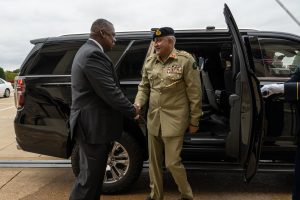Pakistan’s Chief of Army Staff (COAS) General Qamar Javed Bajwa’s recent visit to the U.S. was probably his last international trip before retiring from service. Bajwa is expected to call it a day on November 29 this year, ending a six-year stint as the head of the military in a country that is going through one of the worst political and financial challenges in its history.
Addressing a gathering of Pakistani diplomats in Washington, the COAS reiterated that he would leave after the completion of his second three-year term. During the address, Bajwa stressed that reviving the country’s ailing economy should be a key priority, adding that “there could be no diplomacy either without a strong economy.”
During his U.S. visit, General Bajwa held meetings with Secretary of Defense Lloyd Austin and National Security Adviser Jake Sullivan and discussed the regional security situation. “Matters of mutual interest, regional security situation and bilateral cooperation in various fields were discussed,” the Pakistan military’s Inter-Services Public Relations (ISPR) said.
“The visit is seen as an effort to help build up U.S.-Pakistan relations and help build up his own legacy as he nears retirement,” said Michael Kugelman, deputy director of the Asia Program at the Wilson Center. Bajwa has, on many occasions during his long stint as army chief, facilitated the repairing of ties with Washington.
Ties between Pakistan and the United States have been strained of late with former Prime Minister Imran Khan hurling accusations at Washington for its alleged involvement in the ouster of his government. A few days ago, Prime Minister Shehbaz Sharif said that “Imran Khan has damaged Pakistan’s relations with the United States for no rhyme or reason.”
The Biden government has stepped up attempts to mend ties with Pakistan. In April, Donald Armin Blome assumed his role as U.S. ambassador to Pakistan filling a position that remained vacant since 2018. Over the last few months, several high-ranking U.S. officials and members of Congress have visited Pakistan in the aftermath of the floods.
Besides, it seems that Bajwa has been able to revitalize the defense partnership between the two countries, an area that also interests Washington due to its security needs in the region, particularly with regard to keeping an eye on militant groups in Afghanistan. After meeting Gen Bajwa, U.S. Defense Secretary Lloyd J. Austin said that his talks with the Pakistan army chief focused on the long-standing partnership between the two defense establishments and other areas of mutual interest.
Efforts in this regard began months ago. In April, Pakistan’s army chief acknowledged that his country had “excellent” relations with the U.S., adding that the best military equipment Pakistan received was from the Americans. “The good army we have today is largely built and trained by the U.S. The best equipment we have is American equipment. We still have deep cooperation with the U.S. and our Western friends,” he pointed out. Last month, the U.S. State Department resumed critical military assistance to Pakistan after suspending it for years.
Defending a recently approved $450 million F-16 deal to Pakistan, U.S. Secretary of State Antony Blinken said last week that “Pakistan’s program bolsters its capability to deal with terrorist threats emanating from Pakistan or from the region. It’s in no one’s interests that those threats be able to go forward with impunity.”
For decades, Pakistan and the U.S.’s military partnership has survived political challenges in both countries. To some extent, the purpose of Bajwa’s visit was to convey that ties between the Pakistan army and the U.S. military establishment remain established and will not be negatively impacted after his departure.
“It is perhaps a kind of assurance to the Americans by the army chief that whatever we agree, Pakistan will continue with [that] policy,” academician and policy expert Hassan Askari Rizvi told Al Jazeera. “It is not about an individual, but an institution, which is on board with the policy of improving Pakistani-U.S. relations,” he emphasized.
Pakistan’s civilian governments and army have long relied on Washington for financial support, military hardware and training, and international legitimacy. Arguably, nobody in Pakistan’s ruling elite wants to undermine that relationship with Washington at a time when Islamabad faces a host of economic and financial challenges, which would certainly require U.S. assistance at many forums.

































